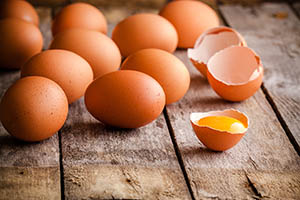It
aly's Emma Morano will be celebrating her 117th birthday at the end of this month. She's the oldest living person in the world.And when she was asked what her secret to longevity was, she didn't miss a beat.
Her answer? She eats two or three eggs every day.
I'm not at all surprised by Emma's long, healthy life. People thrived on eggs for millions of years.
The Myth of Eggs and Cholesterol
That is, until the 1950s, when they came under attack because they're high in cholesterol. Around that time, cholesterol was blamed for causing heart disease.
And we now know that's not true.
Cholesterol doesn't cause heart disease. And eggs don't cause heart disease.
A study from Harvard followed 118,000 men and women for 14 years. It found no link between eating eggs and the risk of heart disease or stroke.1
In fact, another study of almost 600,000 people found that eating one egg a day actually lowered the risk of stroke by 12%.2
As far as I can tell from my own practice and research, you can live on nothing but eggs. I've had healthy patients who eat 20 eggs a day. One South American body builder I saw as a patient ate 18 eggs a day for many years. He had 4% body fat and no heart disease at all!
The truth is there is zero scientific proof that eggs are unhealthy for your heart. Just the opposite… eggs are one of the most perfect foods for humans.
Health Benefits of Pastured Eggs

They are an excellent source of highly absorbable protein. They have every amino acid you need in exactly the ratio you need it. You can also digest the protein from eggs better than meat, fish or any other food you eat.
And it's not just the protein that makes eggs so healthy. I call eggs "nature's vitamin pills." They have every vitamin you need — all the B vitamins and vitamin C. They even have the fat soluble vitamins A, D, E and K that are so hard to come by in the modern world.
I eat eggs every day, and I recommend the same for my patients. But don't buy just any eggs.
Most supermarket eggs come from factory-farmed chickens. They are raised in filthy huts with hundreds of cages stacked as many as two stories high.
Chickens raised in those conditions are 25 times more likely to become contaminated with salmonella than free-roaming chickens.3
And factory eggs are much less nutritious than eggs from hens that roam free. When I did my own tests on pastured eggs from my local farmer they were off the charts for omega-3s, antioxidants, nutrients and protein. They had:
- 65% fewer carbs than a regular egg
- 10% more protein
- 20% more iron
- 72% more vitamin A
- 211% more of the vision-sharpening carotenoids called lutein and zeaxanthin
- 319% more healthy omega-3s
- 1,664% more calcium
The 4 Most Important Things to Know
When Buying Eggs

1. Look for eggs labeled "Pastured" or "Pasture Raised." I call them the "Rolls Royce" of eggs. They have much higher nutrient levels and less chance of passing along disease.
Pastured chickens live on small farms where they run around freely. Each day they're herded in small groups to fresh pastureland. They have fresh greens to eat and a clean environment. These chickens have plenty of space, sunshine and a natural diet to eat.
2. Don't get pastured confused with "free-range." The USDA allows a "free-range" label if the chicken coop has a door to the outside. But that doesn't mean the chickens actually ever see the light of day.
3. If you can't find pastured eggs, my second choice is organic. Organic eggs come from cage-free hens fed organic, vegetarian feed. Neither the hens nor their feed are subjected to antibiotics, hormones or pesticides.
4. To find pastured eggs from a local farmer or farmer's market near you, check out www.LocalHarvest.org.
To Your Good Health,
![]()
Al Sears, MD, CNS
1. Hu FB, Stampfer MJ., et al. "A prospective study of egg consumption and risk of cardiovascular disease in men and women." JAMA. 1999 Apr 21;281(15):1387-94.
2. Sylvia Booth Hubbard. "Eggs Reduce Stroke Risk." Newsmax Health; November 1, 2016.
3. "Report of the Task Force on Zoonoses Data Collection on the Analysis of the baseline study on the prevalence of Salmonella in holdings of laying hen flocks of Gallus gallus" EFSA.2007 Feb.

